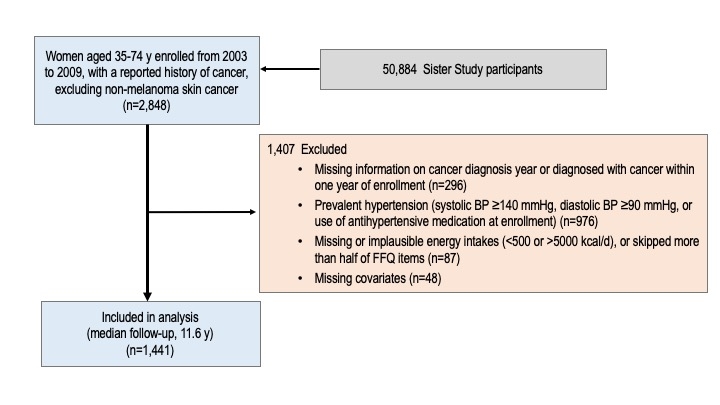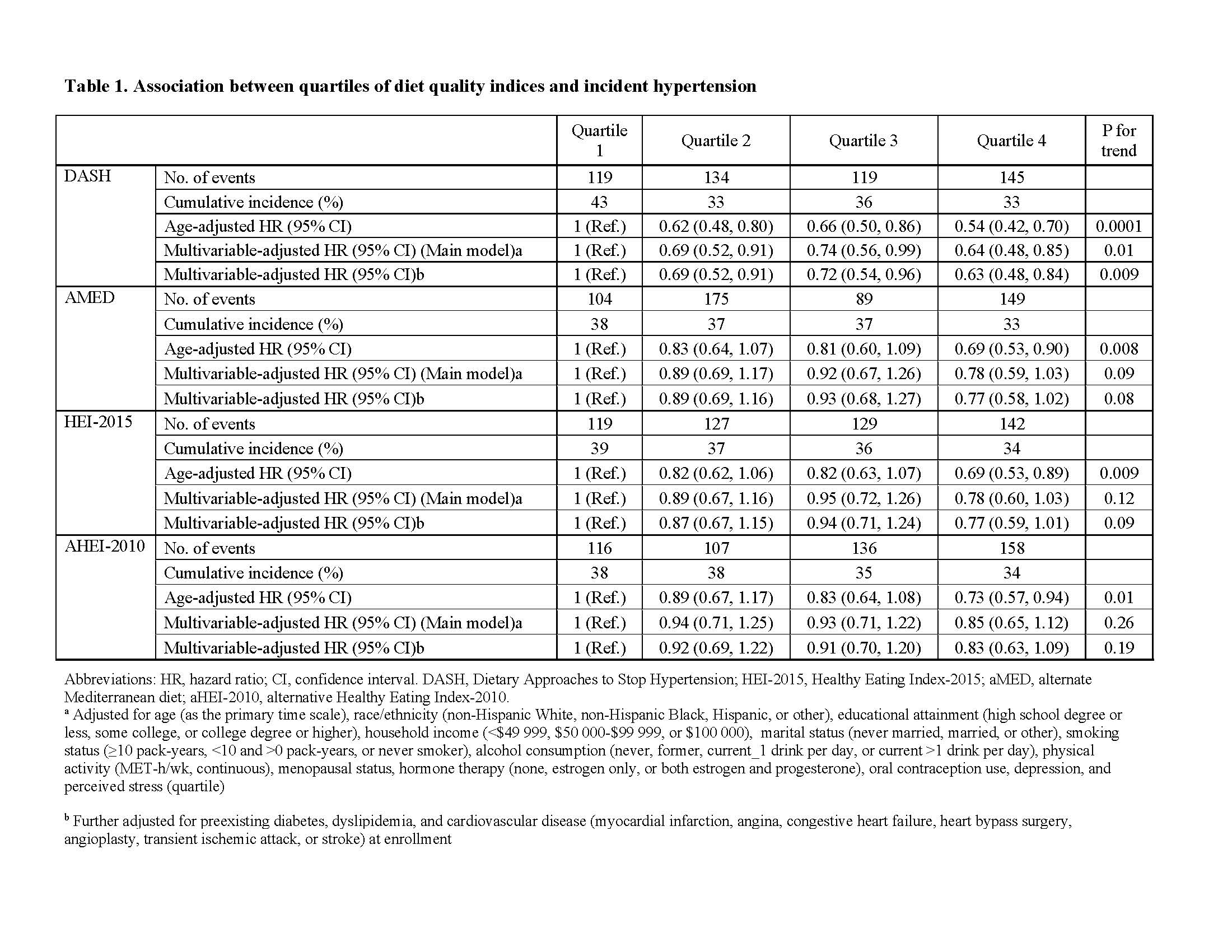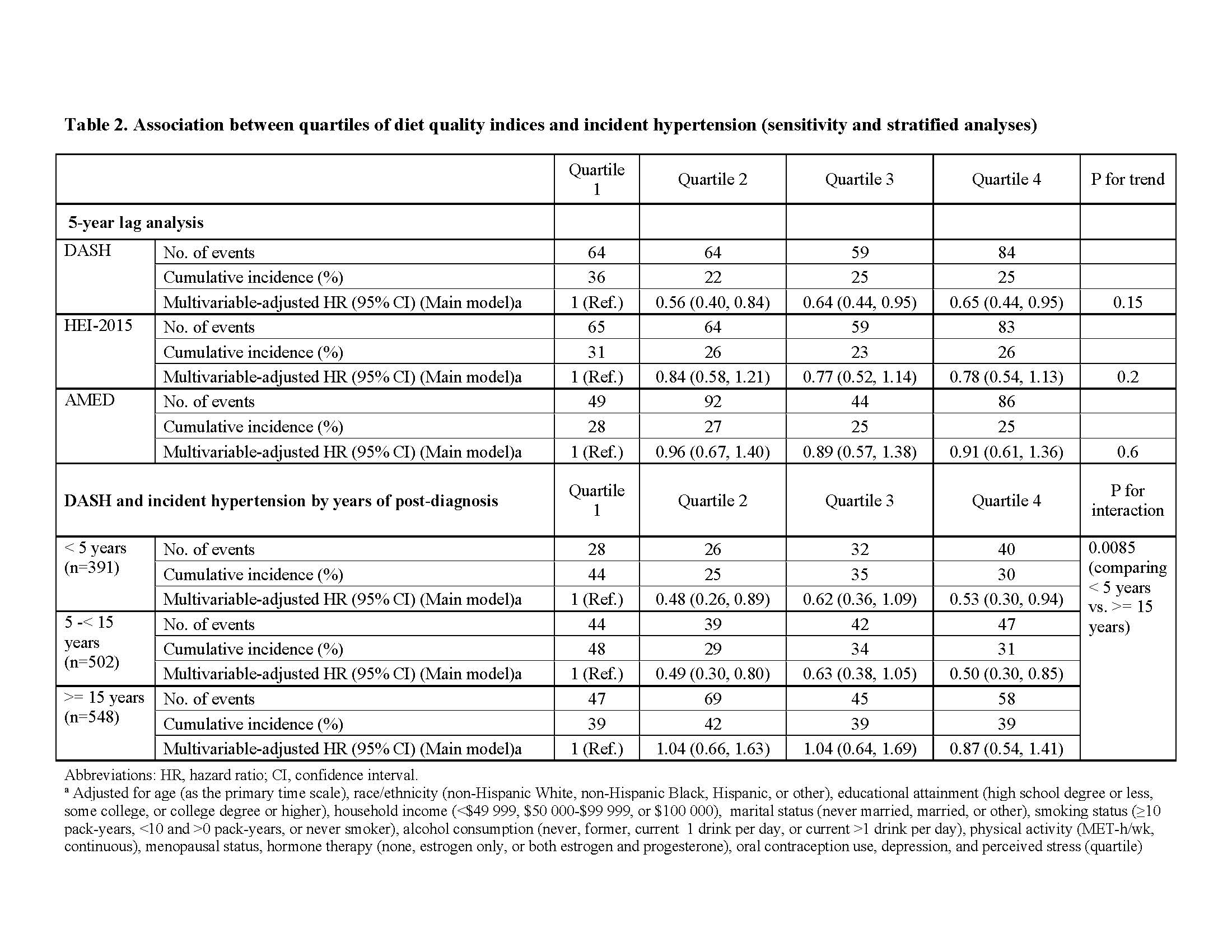Final ID: P3075
Diet quality and risk of hypertension in women cancer survivors
Abstract Body: Background: Higher diet quality has been associated with reduced hypertension risk in the general population. Although women cancer survivors are at elevated risk of hypertension following cancer treatment, it is unclear if diet quality is also associated with risk of hypertension among women cancer survivors.
Methods: We analyzed 1,441 women (aged 35 to 74 years) from the Sister Study (2003-2009) who reported a history of cancer other than non-melanoma skin cancer and had no prevalent hypertension at enrollment. Prevalent hypertension was defined as systolic blood pressure (BP) ≥140 mmHg, diastolic BP ≥90 mmHg, or the use of antihypertensive medication at enrollment. Participants diagnosed with cancer within one year of enrollment were excluded. The median time since diagnosis was 11.4 years. Participants were followed through September 2021 (median follow-up: 11.6 years). Dietary quality was assessed using the validated 110-item Block food frequency questionnaire and categorized into quartiles based on the entire Sister Study population for Dietary Approaches to Stop Hypertension (DASH), Healthy Eating Index (HEI-2015), alternate Mediterranean diet (aMED), and alternative Healthy Eating Index (aHEI-2010). Incident hypertension was self-reported as a new diagnosis or initiation of antihypertensive medication at any time during follow-up. Multivariable Cox proportional hazards models were used to estimate hazard ratios (HRs) and 95% confidence intervals (CIs) for incident hypertension.
Results: After adjusting for potential confounders, higher DASH scores were associated with decreased risk of incident hypertension (HRQ4vsQ1 0.63, 95% CI 0.48-0.84, Ptrend=0.01). Associations were weaker for aMED (HRQ4vsQ1 0.78, 95% CI 0.59-1.03, Ptrend=0.09) and HEI-2015 (HRQ4vsQ1 0.78, 95% CI 0.60-1.03, Ptrend=0.12), and no significant association was found for aHEI-2010. A 5-year lag analysis yielded similar results. DASH remained associated with reduced hypertension risk even after adjusting for pre-existing diabetes, dyslipidemia, and cardiovascular disease history. The association between DASH and hypertension risk was not evident in long-term survivors (≥15 years post-diagnosis). A stricter hypertension definition (BP ≥130/80 mmHg) did not materially change the findings.
Conclusion: Our findings suggest that higher diet quality, particularly following DASH dietary patterns is associated with reduced risk of hypertension in women cancer survivors.
Methods: We analyzed 1,441 women (aged 35 to 74 years) from the Sister Study (2003-2009) who reported a history of cancer other than non-melanoma skin cancer and had no prevalent hypertension at enrollment. Prevalent hypertension was defined as systolic blood pressure (BP) ≥140 mmHg, diastolic BP ≥90 mmHg, or the use of antihypertensive medication at enrollment. Participants diagnosed with cancer within one year of enrollment were excluded. The median time since diagnosis was 11.4 years. Participants were followed through September 2021 (median follow-up: 11.6 years). Dietary quality was assessed using the validated 110-item Block food frequency questionnaire and categorized into quartiles based on the entire Sister Study population for Dietary Approaches to Stop Hypertension (DASH), Healthy Eating Index (HEI-2015), alternate Mediterranean diet (aMED), and alternative Healthy Eating Index (aHEI-2010). Incident hypertension was self-reported as a new diagnosis or initiation of antihypertensive medication at any time during follow-up. Multivariable Cox proportional hazards models were used to estimate hazard ratios (HRs) and 95% confidence intervals (CIs) for incident hypertension.
Results: After adjusting for potential confounders, higher DASH scores were associated with decreased risk of incident hypertension (HRQ4vsQ1 0.63, 95% CI 0.48-0.84, Ptrend=0.01). Associations were weaker for aMED (HRQ4vsQ1 0.78, 95% CI 0.59-1.03, Ptrend=0.09) and HEI-2015 (HRQ4vsQ1 0.78, 95% CI 0.60-1.03, Ptrend=0.12), and no significant association was found for aHEI-2010. A 5-year lag analysis yielded similar results. DASH remained associated with reduced hypertension risk even after adjusting for pre-existing diabetes, dyslipidemia, and cardiovascular disease history. The association between DASH and hypertension risk was not evident in long-term survivors (≥15 years post-diagnosis). A stricter hypertension definition (BP ≥130/80 mmHg) did not materially change the findings.
Conclusion: Our findings suggest that higher diet quality, particularly following DASH dietary patterns is associated with reduced risk of hypertension in women cancer survivors.
More abstracts on this topic:
Adverse Pregnancy Outcomes Are Associated with Incident Peripheral Artery Disease, Results from the Women’s Health Initiative.
Jackson Elizabeth, Leblanc Erin, Haring Bernhard, Harrington Laura, Allison Matthew, Eaton Charles, Lamonte Michael, Hovey Kathleen, Andrews Chris, Wells Gretchen, Manson Joann, Levitan Emily, Spracklen Cassandra, Wild Robert
A Multicenter Study of Detection of Pulmonary Hypertension Based on Point-of-Care 12- Lead ECG DataDubrock Hilary, Wieczorek Mikolaj, Hackett Sarah, Alger Heather, Carlson Katherine, Klugherz Paul, Carter Rickey, Wagner Tyler, Johnson Patrick, Frantz Robert, Strom Jordan, Waks Jonathan, Agarwal Richa, Hemnes Anna, Steinberg Benjamin, Pandey Ambarish



